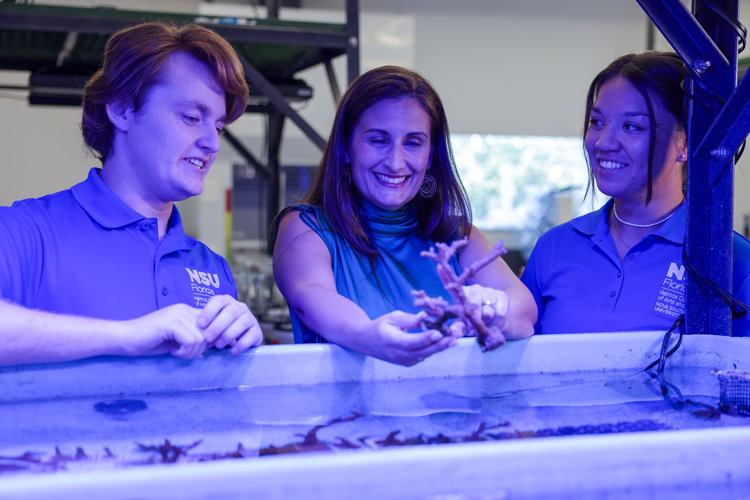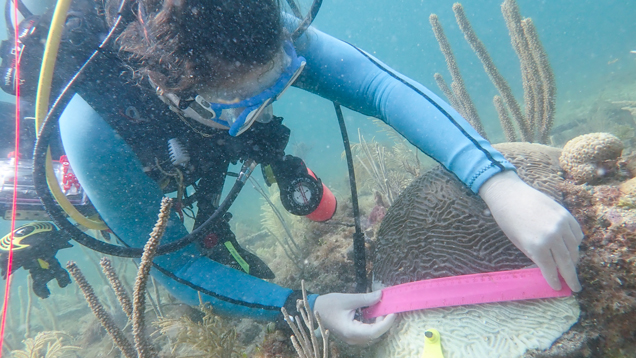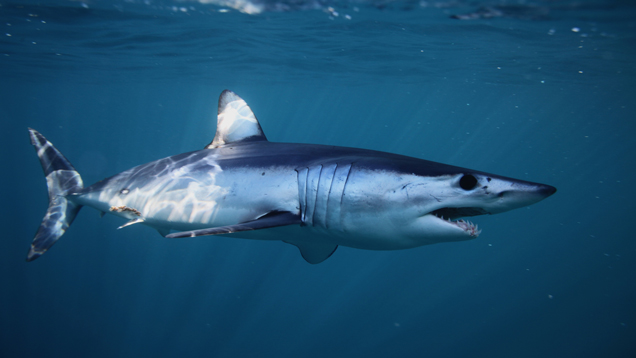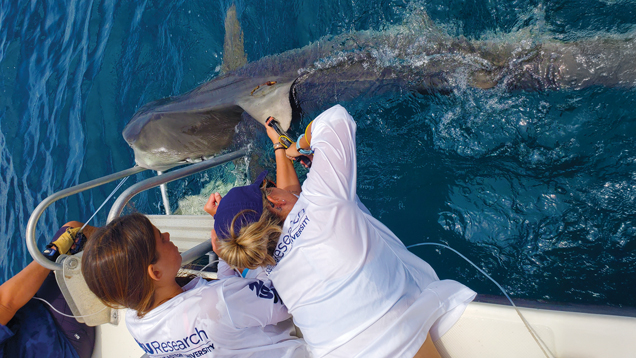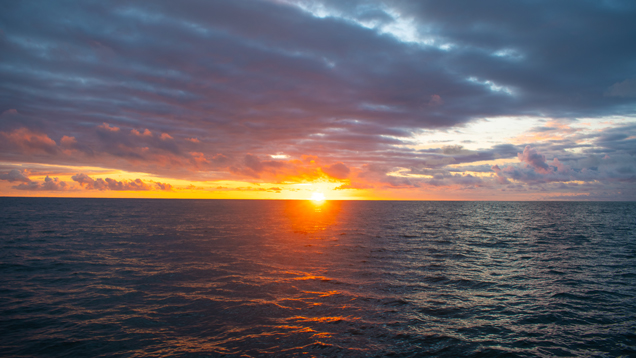From groundbreaking programs saving coral reef ecosystems to discoveries advancing milestone policy changes in shark conservation, NSU Ocean's research has fostered healthier ecosystems and fisheries, preserved keystone species, and led the way to a more sustainable, resilient blue economy.
Leading-edge oceanographic science at Nova Southeastern University continues as NSU Ocean tackles the latest challenges facing our seas and coastal communities.
Sea Level Rise and Adaptation
Between glacial melt, extreme storms, and tidal flooding, rising seas threaten both
coastal and inland economies worldwide with costly disruptions, placing $619 billion
in property values at risk in Florida alone.
With global initiatives to spread awareness of these challenges, the NSU Rising Seas
Institute at NSU Ocean is leading the way to a future of resilience and adaptation
for coastal and inland communities.
Greenland Expeditions
The NSU Rising Seas Institute leads exclusive, multi-day expeditions to Greenland’s ice sheets. Participants engage in up-close encounters with extreme glacial melt and transformative educational experiences that inspire intelligent adaptation.
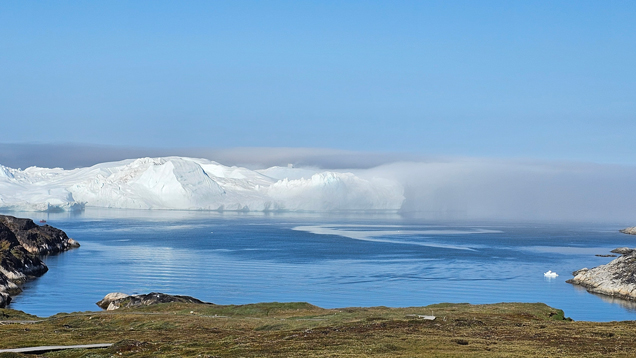
From Coral Propagation to Ecosystem Restoration
Florida’s ocean reefs are vital for healthy marine ecosystems and coastal protection, generating more than $679 million in economic value through activities such as diving, snorkeling, and fishing—yet they’ve lost 90% of their coral cover since the 1970s. Through research and conservation programs led by the National Coral Reef Institute (NCRI) and other key collaborations, NSU Ocean is pioneering techniques to revitalize Florida’s reefs.
Raising Thousands of Corals to Regenerate Reefs
NSU Ocean is producing corals at our land-based and offshore coral nurseries—significantly upscaling reef restoration in Florida and the Caribbean. Joana Figueiredo, Ph.D., and her lab are optimizing local coral propagation. From mimicking the moon’s cycles to trigger spawning to planting more than 5,000 baby corals on Florida reefs, NSU Ocean is a hub of expertise for coral reproduction and restoration training.
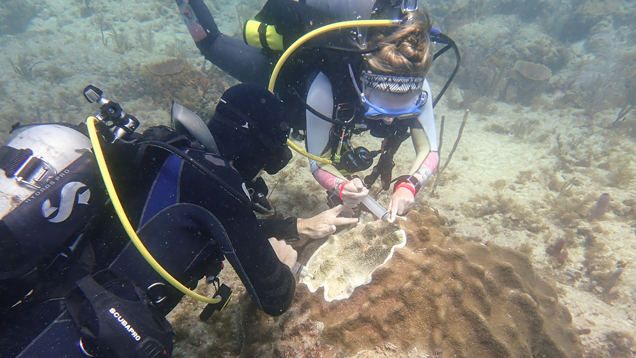
Studying Coral Resilience Amid Ocean Heatwaves
Record-high ocean temperatures can lead to widespread coral bleaching and death. NSU Ocean scientist Karen Neely’s long-term monitoring of more than 4,200 coral colonies across nine Florida reefs studied how heatwaves impact coral mortality. Certain reef-building species, such as boulder and brain corals, die less frequently from bleaching. Such insights could guide future restoration strategies to focus on heat-tolerant corals.
Saving Sharks and Searching for Cures
This iconic apex predator is vital to healthy ocean ecosystems and may hold clues to treating human diseases. NSU scientists have found that many shark species are under serious threat, with about 100 million killed each year—some illegally—for their fins, meat, and other products.
NSU Ocean has led research to identify the greatest threats facing these species, foster hope for their future, and uncover shark science for human health.
Landmark Genetic Discovery Gives Hope for Endangered Species
For the first time, NSU scientists sequenced entire genomes for mitochondrial DNA, scanning the nuclear genomes of shortfin mako sharks from the near-entire Atlantic distribution of this species. Their discovery shows a surprising range of genetic diversity for an endangered species facing extinction—promising a hopeful future if overfishing can be quickly curbed.
Shark Tracking Opens Window into Mysteries of Iconic Species
NSU Ocean’s scientists lead pioneering shark tracking research, including one of the world's largest global shark movement ecology research programs. By tracking hundreds of sharks—such as smooth hammerhead, shortfin mako, sailfish, and tiger sharks—we're advancing our understanding of migration patterns and supporting conservation, policy, and public education efforts.
Deep-Sea Science for Healthier Fisheries
Though more than 70% percent of Earth is covered by water, much remains unknown about the world’s oceans—and NSU researchers are shining a light on the deepest mysteries of marine ecology.
From research that illuminates deep-sea life to discoveries of new species to insights that have advanced deep-sea ecological management, NSU Ocean researchers have led groundbreaking science from the Gulf of Mexico to the Sargasso Sea.
Shining a Light on the Twilight Zone
Most of the world’s fish (by biomass) lives in what is called the mesopelagic—or the twilight—zone, ranging from 200 to 1,000 feet below sea level where the sun’s rays reach dimly. NSU Ocean scientists were part of a comprehensive study of these understudied mesopelagic fish, their traits, and their ecological roles, contributing to future management strategies and to our understanding of how the ocean ecosystem functions.
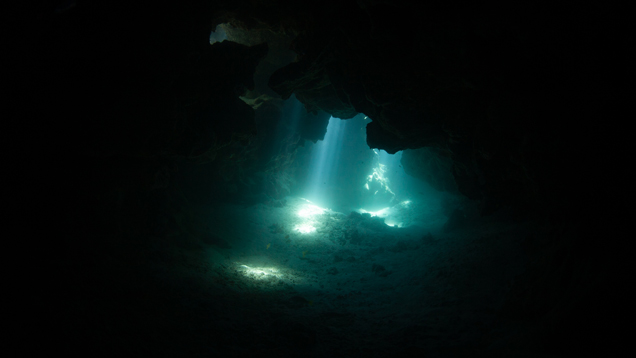
Uncovering the Impact of Deep-Sea Oil Spills
After the Deepwater Horizon oil spill in 2010, NSU scientists led pivotal research into the long-term ecological impacts on key species like krill and deep-sea crustaceans. NSU Ocean researchers advanced the first comprehensive study of krill distributions below 1,000 meters in the region, establishing essential baseline data to track recovery and future changes in these populations.
Diving into the DEEPEND
NSU researcher Tracey Sutton, Ph.D., is director and principal investigator of the DEEPEND Consortium, an initiative with more than 140 participants from 22 institutions. In the past 14 years, DEEPEND has discovered one out of every nine fish species known to live in the Gulf of Mexico. Dedicated to research and stewardship of the organisms and communities of the open ocean, including the effects of human activities on those communities, DEEPEND is increasing awareness of life in the deep sea and training the next generation of ocean scientists and resource managers.
A Few of Our Funding Partners
- Coastal Eco-Group Inc.
- Florida Department of Environmental Protection
- Geological Society of America
- Herbert W. Hoover Foundation
- National Geographic Society
- National Oceanic and Atmospheric Administration (NOAA)
- Sea Turtle Conservation Program of Broward County
- South Florida Water Management District
- U.S. Department of Defense

